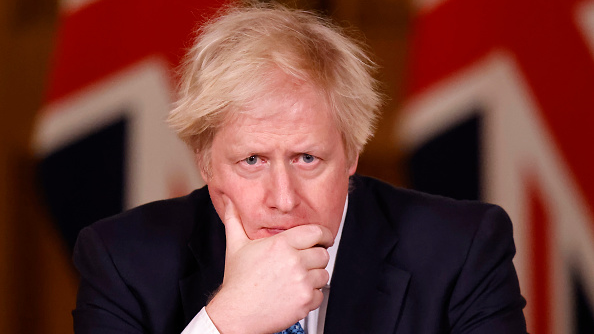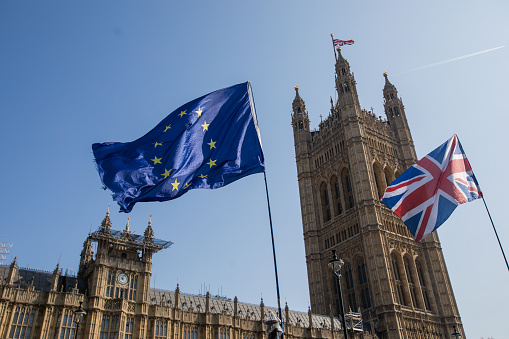
British Prime Minister Boris Johnson. /Getty
British Prime Minister Boris Johnson. /Getty
Editor's note: Freddie Reidy is a freelance writer based in London. He studied history and history of art at the University of Kent, Canterbury, specializing in Russian history and international politics. The article reflects the author's opinions, and not necessarily the views of CGTN.
The UK's exit from the EU may have passed with little fanfare on January 1, but as one hurdle is cleared, another comes into view.
While the deal sailed through parliament, provisions absent from the agreement did not go unnoticed.
Former Prime Minister Theresa May led criticism of the major omission of an agreement on future financial service access to the EU.
"In 2018 in Mansion house, I said that we wanted to work to get a financial services deal in the future treaty arrangement and that it would be truly groundbreaking."
The UK financial services industry accounts for around 150 billion pounds (£204 billion) a year, or 7 percent of total UK economic output. A risk to the sector caused by diminished access to the EU market is therefore, a grave threat.
"We have a deal in trade which benefits the EU, but not a deal in services that would have benefited the UK … I hope the government will go to negotiations with alacrity and vigor."
Striking a more optimistic note, current PM Boris Johnson spoke to 250 UK business leaders offering a bright vision for the UK's future outside the EU. Citing a five-fold rationale for optimism, the PM pointed to the increased capitalization of consumers, stable unemployment levels despite the pandemic, many firms having prospered in pandemic, the summer spending boom as evidence of market resilience and finally, the signing of the Brexit deal.
It was then that Johnson turned to those on the call, inviting them to come up with areas where existing regulations could be improved or removed entirely, touting the newfound freedom and sovereignty the new deal affords.

Johnson apparently offered an artistic analogy, stating that while the paint was still wet, there was scope for business to add to the fresco.
Such an invitation may have been well received by some of those on the call, but the news will have alarmed many in Brussels who fear for the EU's own competitive edge.
While the Brexit agreement does afford some leeway on a variety of issues, the UK is committed to preserving the "level playing field" with largely aligned policies on workers' rights and environmental policies. A substantial divergence would lead to economic sanctions.
The "level playing field" is also the pretext for an agreement on preserving existing EU market access for financial services under an arrangement of "equivalence." The basis of negotiations on this subject is due to be agreed in March.
Johnson's invitation can be interpreted as a demonstration that he will not to be "brought into line" by the EU threatening a "no deal" on equivalence and is instead demonstrating the freedoms Brexit now affords the UK. Inviting business leaders to contribute to future regulations could be viewed as a veiled threat of deregulation.
The British PM is therefore attempting to court overtures from Brussels that would deliver equivalence for what is likely to be a request for greater alignment on standards not covered by the deal, many of which UK businesses are keen on signing up to in any case due to eased export terms.
Within the context of Brexit, equivalence is a huge prize. Ernst & Young estimated at the beginning of 2019 that since the Brexit referendum, £1 trillion of assets have been transferred to the rest of Europe from the UK. While the City is undoubtedly a global player with many benefits, EU market access is vital with nearly half of all exported financial services, 25 billion pounds a year, going to the EU.
Downing Street issued a statement after the call reaffirming that the PM is "committed to working with British businesses to realize the vast opportunities on offer as the UK forges an independent future, and welcomed that firms can now look with certainty at the year ahead."
With markets anticipating a very thin agreement shy of equivalence, things would in fact appear far from certain. Any threat to the 7 percent of economic output financial services provide, threatens the UK's tax base and ability to kick-start the economy post-COVID-19. It would also severely diminish Johnson's ability to realize his flagship policies of infrastructure spending and "leveling-up the UK."
Johnson therefore finds himself in a race towards his next obstacle, gambling that continued cooperation and alignment will be mutually beneficial and enough to persuade the EU to help him clear the final hurdle.
(If you want to contribute and have specific expertise, please contact us at opinions@cgtn.com.)

